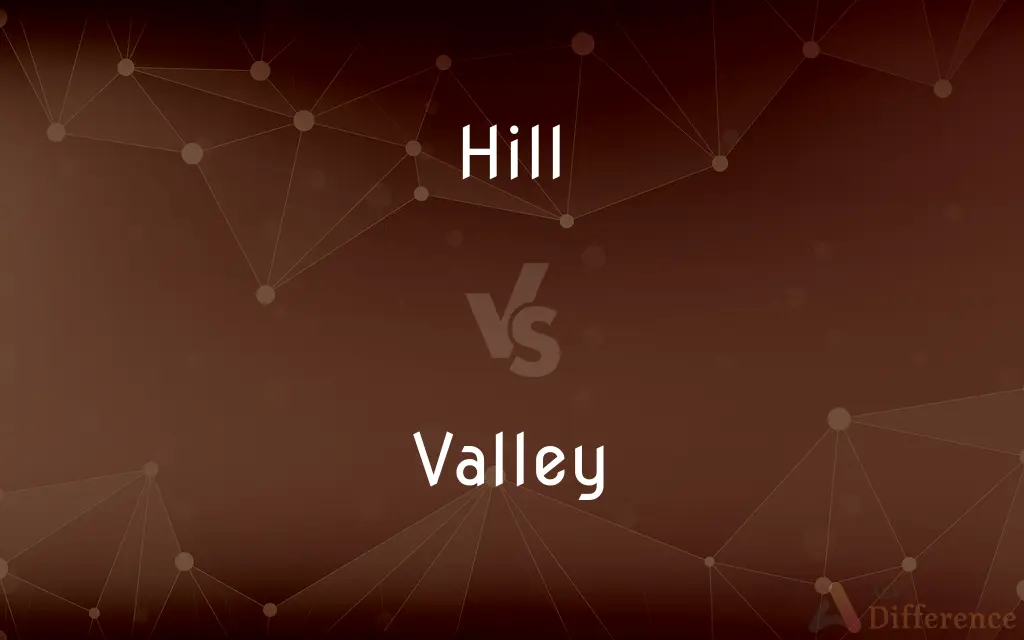Hill vs. Valley — What's the Difference?
By Tayyaba Rehman — Updated on December 29, 2023
A hill is a raised area or mound of land, smaller than a mountain, while a valley is a low area between hills or mountains, often where a river or stream flows.

Difference Between Hill and Valley
Table of Contents
ADVERTISEMENT
Key Differences
A hill is characterized by its elevation above the surrounding terrain, forming a small mound or peak. A valley, in contrast, is a depression or low area between hills or mountains.
Hills are formed through various geological processes such as erosion and can vary greatly in size and shape. Valleys are formed by erosion caused by rivers or glaciers and are defined by their low land surrounded by higher ground.
Hills contribute to landscape diversity, offering elevated viewpoints and unique ecological environments. Valleys often have rivers or streams flowing through them, creating fertile land ideal for agriculture and habitats.
Hills have been historically significant for defense, and today they are often valued for recreation and scenery. Valleys, with their often lush and fertile lands, have been crucial for human settlements and agriculture.
Hills can affect local climate by impacting wind patterns and precipitation. Valleys can have microclimates that are cooler or warmer and can be prone to fog accumulation.
ADVERTISEMENT
Comparison Chart
Geographic Feature
Elevated area, smaller than a mountain
Low area between hills or mountains
Formation
Formed by erosion and accumulation
Formed by river or glacial erosion
Landscape Role
Provides elevation and viewpoints
Offers lower land, often with watercourses
Ecological Significance
Diverse flora and fauna habitats
Fertile lands suitable for agriculture
Climatic Impact
Influences local wind and precipitation
May have unique microclimates
Compare with Definitions
Hill
A natural elevation of the earth's surface.
The hill offered a panoramic view of the city.
Valley
A low area between hills or mountains, often with a river running through it.
The valley was lush and green, with a river winding through it.
Hill
A raised landform used for various recreational activities.
They went hiking up the green hill behind their village.
Valley
An elongated lowland between ranges of mountains, hills, or other uplands.
The valley was known for its fertile soil and vibrant wildflowers.
Hill
A small mound or peak rising above the surrounding land.
Children enjoyed sledding down the snowy hill.
Valley
A region known for agriculture due to its fertile lands.
The farmers cultivated a variety of crops in the rich valley.
Hill
A plant thus covered.
Valley
An area characterized by serene beauty and tranquility.
The tranquil valley was a perfect escape from the bustling city.
Hill
An elevated area less steep and lower than a mountain.
The house was nestled on a gentle hill.
Valley
A valley is an elongated low area often running between hills or mountains, which will typically contain a river or stream running from one end to the other. Most valleys are formed by erosion of the land surface by rivers or streams over a very long period of time.
Hill
A geographical feature often used for defense in historical contexts.
The ancient fort was strategically built on top of the hill.
Valley
A depression in the land caused by erosion.
They explored the deep valley carved out by the ancient glacier.
Hill
A hill is a landform that extends above the surrounding terrain. It often has a distinct summit.
Valley
A low area of land between hills or mountains, typically with a river or stream flowing through it
The valley floor
The Thames Valley
Hill
A well-defined natural elevation smaller than a mountain.
Valley
An internal angle formed by the intersecting planes of a roof, or by the slope of a roof and a wall.
Hill
A small heap, pile, or mound.
Valley
An elongated lowland between ranges of mountains, hills, or other uplands, often having a river or stream running along the bottom.
Hill
A mound of earth piled around and over a plant.
Valley
An extensive area of land drained or irrigated by a river system.
Hill
An incline, especially of a road; a slope.
Valley
A depression or hollow resembling or suggesting a valley, as the point at which the two slopes of a roof meet.
Hill
Capitol Hill. Often used with the.
Valley
An elongated depression cast between hills or mountains, often garnished with a river flowing through it.
Hill
The US Congress. Often used with the.
Valley
An area which drains itself into a river.
Hill
To form into a hill, pile, or heap.
Valley
Any structure resembling one, e.g. the interior angle formed by the intersection of two sloping roof planes.
Hill
To cover (a plant) with a mound of soil.
Valley
To form the shape of a valley.
Hill
An elevated landmass smaller than a mountain.
The park is sheltered from the wind by a hill to the east.
Valley
The space inclosed between ranges of hills or mountains; the strip of land at the bottom of the depressions intersecting a country, including usually the bed of a stream, with frequently broad alluvial plains on one or both sides of the stream. Also used figuratively.
The valley of the shadow of death.
Sweet interchangeOf hill and valley, rivers, woods, and plains.
Hill
A sloping road.
You need to pick up speed to get up the hill that's coming up.
Valley
The place of meeting of two slopes of a roof, which have their plates running in different directions, and form on the plan a reëntrant angle.
Hill
(US) A heap of earth surrounding a plant.
Valley
A long depression in the surface of the land that usually contains a river
Hill
(US) A single cluster or group of plants growing close together, and having the earth heaped up about them.
A hill of corn or potatoes
Hill
(baseball) The pitcher’s mound.
Hill
The raised portion of the surface of a vinyl record.
Hill
To form into a heap or mound.
Hill
To heap or draw earth around plants.
Hill
A natural elevation of land, or a mass of earth rising above the common level of the surrounding land; an eminence less than a mountain.
Every mountain and hill shall be made low.
Hill
A single cluster or group of plants growing close together, and having the earth heaped up about them; as, a hill of corn or potatoes.
Hill
To surround with earth; to heap or draw earth around or upon; as, to hill corn.
Showing them how to plant and hill it.
Hill
A local and well-defined elevation of the land
Hill
Structure consisting of an artificial heap or bank usually of earth or stones;
They built small mounds to hide behind
Hill
United States railroad tycoon (1838-1916)
Hill
Risque English comedian (1925-1992)
Hill
(baseball) the slight elevation on which the pitcher stands
Hill
Form into a hill
Common Curiosities
Can hills be man-made?
Yes, some hills are artificial, created for various purposes.
Are hills easier to climb than mountains?
Generally, yes, due to their lower elevation and less steep terrain.
Are hills always smaller than mountains?
Generally, yes, hills are smaller and less steep than mountains.
Can valleys be found in urban areas?
Yes, valleys can exist in both urban and rural areas.
Do valleys always have water sources?
Many valleys have rivers or streams, but not all.
What kind of vegetation is found in valleys?
Valleys often have diverse vegetation, depending on climate and water availability.
Is it common to build cities in valleys?
Yes, valleys often provide sheltered and fertile locations for settlements.
Are all valleys formed by rivers?
Many are, but some valleys are formed by glacial activity.
Are valleys prone to fog?
Yes, valleys can accumulate fog due to their low-lying nature.
Can hills provide natural defense?
Historically, hills were often used for defense due to their elevated position.
Can hills have flat tops?
Yes, some hills have flat summits, known as plateaus.
Do hills affect weather patterns?
Yes, hills can influence local climate, like wind and rain patterns.
What is a river valley?
A river valley is a valley formed by river erosion, often fertile.
Do animals live on hills?
Yes, a variety of wildlife can be found on hills.
Do rivers always flow through valleys?
Many valleys have rivers, but it's not a universal characteristic.
Share Your Discovery

Previous Comparison
Internship vs. Traineeship
Next Comparison
Skill vs. TechniqueAuthor Spotlight
Written by
Tayyaba RehmanTayyaba Rehman is a distinguished writer, currently serving as a primary contributor to askdifference.com. As a researcher in semantics and etymology, Tayyaba's passion for the complexity of languages and their distinctions has found a perfect home on the platform. Tayyaba delves into the intricacies of language, distinguishing between commonly confused words and phrases, thereby providing clarity for readers worldwide.
















































